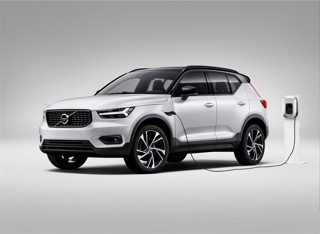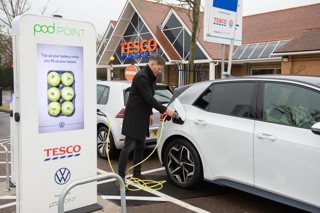Fleets and company car drivers seeking electric cars face further frustration this year as supply constraints and production delays experienced in 2019 are unlikely to be resolved.
Adding to their woes is the fact that many cars being launched are available to pre-order, which presents a barrier for fleets on contract hire agreements.
An array of new electric cars will be launched in the coming months, with major carmakers adding new vehicles in various segments. Many of these are subject to retail buyer-focused pre-orders with few units remaining for fleet and leasing companies.
Demand for electric vehicles (EVs) from fleets boomed in 2019 after the Government announced plans to reduce benefit-in-kind (BIK) tax rates for zero-emission models to 0% in the 2020/21 tax year (pending ratification in the March Budget).
Company car drivers looking to capitalise on the tax savings have largely been met by blockages due to electric models being unavailable for quotes and manufacturers not working with fleet customers to manage expectations.
Kia admitted to Fleet News last year that it was initially focused on retail buyers, with a small allocation of its sell-out E-Niro model ringfenced for fleet customers.
Simon King, fleet and procurement director at Mitie, said: “OEMs have lead times of up to 15 months on some models. There are big challenges around making sure you actually get hold of those. You have to engage with the OEMs very early.
“We made a commitment to have 20% of our fleet electric by 2020. We’ve got around 420 at the moment and a further 300 vehicles to find before the end of 2020.
“I want to buy 5,500 electric vehicles in the next five-to-10 years, but the OEMs don’t return my calls. They don’t want to talk to me.”
Society of Motor Manufacturers and Traders (SMMT) figures show registrations of electric and plug-in hybrid models, known as ultra-low emission vehicles (ULEVs), reached a record of more than 72,000 in 2019 – accounting for 3.1% of all cars sold.
A little more than half of these were for fully-electric models (37,850). While this represents rapid growth, these vehicles account for just 1.6% of all cars sold in the year.
Poppy Welch, head of Go Ultra Low, said: “Fleets have always been drivers of change, often taking the lead on implementing new technologies, so growth in this sector is hugely important to the adoption of EVs. The size and buying power of fleets mean they present an excellent opportunity to raise the number of EVs on our roads and further normalise their use.”
ULEV sales are predicted to reach 5.5% (131,000) of all vehicles sold in 2020, according to forecasts from Bloomberg New Energy Finance. By 2026, they are expected to make up a fifth of sales in the UK.
Vehicle availability in 2020
Lauren Pamma, electrification propositions lead at Lex Autolease, advised drivers to start ordering EVs six months before their renewal is due, giving time to source a car.
She said: “The balance of supply and demand varies in different areas of the market. In certain pockets, such as the luxury end, there is enough supply to meet the demand. In some cases, particularly long-range models which are highly desirable within fleet, we have seen 12-to-18-month lead times. However, this is on selected models.”
There will be more choice in the lower price points this year as Peugeot and Vauxhall introduce the electric 208 and Corsa, while Volkswagen launches the ID3.
However, Volkswagen has already stopped accepting pre-orders for its ID3 First Edition having received 30,000 deposits. People can now only register their interest. Deliveries start in May when order books for the rest for the range open.
Volkswagen expects to sell 100,000 electric cars this year in Europe, but was unable to confirm how many ID3s would be available to UK fleets.
One fleet decision-maker claimed he had been told by VW that he would not be able to source any ID3s this year as all cars had been secured by retail customers.
“We lease our cars so we are unable to pay deposits to pre-order them,” he said.
Vauxhall said it has a “significant allocation” of Corsa-e models available for fleet customers this year, but wouldn’t confirm how many.
Established EV manufacturers like Nissan are better placed. Nissan said it has “adequate” stock of the Leaf and could supply immediately.
Equally, Renault managing director Vincent Tourette is confident its volumes will be increased this year by the new Zoe.
He said: “I have committed to a high level of volumes and so, contrary to many other brands, we will be able to deliver with decent lead times comparable with ICE (internal combustion) engines.
“Why is that? It is because we invested years ago in electric vehicles, so we have the plans, we have the experience, we have the manufacturing capability, we have the battery sourcing secured. So, basically, we are ahead of the pack.”
MG Motor UK’s first EV, the ZS EV, achieved 3,000 pre-orders in the UK when it was announced in July. Deliveries began in September and the brand says it will have fulfilled all current orders by next month.
Around 400 were sold to fleet customers, via MG’s dealer network.
This year, the manufacturer plans to increase its fleet mix, telling Fleet News it has a “strong pipeline of availability”.
Lead times are expected to improve in the coming months for the Chinese-built model, and the brand hopes to fulfil fleet orders “in the thousands”.
Korean brands Hyundai and Kia are also promising more supply.
Kia’s e-Niro model was restricted to just 800 units in 2019 – all sold within two weeks. It still has 3,000 outstanding orders to fulfil but says it has “sufficient supply” to clear the waiting list by July.
We asked Kia how many E-Niro and Soul EV models it will be able to deliver this year, but it declined to provide a figure.
Paul Philpott, president and CEO of Kia Motors (UK) said: “Since launching e-Niro at the beginning of 2019, we have received unprecedented demand which has been a challenge to fulfil. As we enter 2020 with the Soul EV and e-Niro, we are ready to meet customer demand for all-electric cars.”
Similarly, Hyundai was unable to give specific numbers but did say that EVs are “at the heart” of its fleet supply plan for 2020 and availability will be “ramping up” this year.
The Kona Electric, which has only been available via the brand’s online sales platform since launch, will now be offered via its dealer network and Hyundai says it is working with leasing firms to establish how it can better satisfy demand.
Ashley Andrew, managing director of Hyundai UK, said: “The Kona Electric waiting list has come right down because we have satisfied demand for the 2019 model year and we are into the 2020 model year now and are at a stage where we are quoting four months.
“As we’ve moved through from 2019 to 2020, we’ve just increased allocation, so we’ve got extra supply.”
Tesla Model 3 registrations surged in 2019 as the company managed to ship the first of its outstanding orders for UK delivery. Having been available to reserve since July 2017, Q3 2019 saw more than 5,000 registrations. While the brand did not respond to our request for volume predictions, it is quoting a lead time of less than six weeks.
EVs key to hit EU emission targets
The car industry is facing fines of £29 billion this year for failing to meet EU emissions targets. Manufacturers have to hit an emissions average of 95g/km of CO2 for the cars they sell across Europe, but predictions from PA Consulting suggest none will manage it.
Mass registrations of plug-in hybrid and electric cars are required if carmakers are to reduce the overall CO2 output of their fleets.
The UK is included as part of a European average figure. So, while the average emissions of models sold in the UK are higher (127.9g/km) they can be offset against other countries with more EVs, such as Norway.
It is feared that once the UK leaves the EU, carmakers might have to hit the 95g/km target in the UK alone or face the same fines as they will for their entire European sales.
The SMMT has suggested that pure electric registrations would need to rise to more than a quarter (27%) of all car sales to avoid fines.
While this may help boost the availability of EV supply to the UK, they may become more expensive as a result of exchange rate fluctuations and potential trade tariffs.
The Government has also not confirmed whether the plug-in car grant (up to £3,500 towards the cost) will continue beyond March.
Andy Eastlake, managing director of the Low Carbon Vehicle Partnership, believes there is a perfect storm brewing and the success (or otherwise) of Brexit is crucial, read his column here.























john4870 - 31/01/2020 10:57
EV's available to 'pre-order'? Do they really think I'm stupid enough to pre-order a car without trying it for a few hours for driver comfort? I learned that one the hard way many years ago and will NEVER order again without a decent test drive first. I thought manufacturers were supposed to be getting smarter - it appears not.